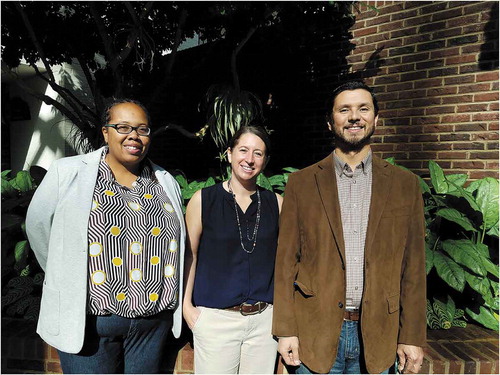As we enter a new year and rollout this new volume of MSJ, we are mindful of the potential of the four essential attributes outlined in This We Believe (developmentally responsive, challenging, empowering, and equitable) (National Middle School Association [NMSA], Citation2010) to create ideal educational experiences and environments for young adolescents. However, we are also aware of the many ways that enacting them often falls short for too many young adolescents. A developmentally responsive school requires teachers to use “the nature of young adolescents as the foundation on which all decisions are made.” When the curriculum is challenging teachers recognize “that every student can learn and everyone is held to high expectations.” Curriculum that is empowering provides “all students with the knowledge and skills they need to take control of their lives.” And equitable middle schools advocate “for every student’s right to learn and provide challenging and relevant learning opportunities.” While these attributes are noble and essential for any successful school for young adolescents, the realities of schooling for many middle school students (and educators) run counter to these attributes.
Within this issue of MSJ, we highlight two areas where we can strengthen our commitment to and enactment of practices that are developmentally responsive, challenging, empowering, and equitable– discipline and curriculum development. As the articles in this issue will highlight, at the heart of successful implementation within both realms is relationship-building. Hammond and Jackson (Citation2015) provide educators with a formula for building the type of relationships with students that lead to self-efficacy and high achievement– rapport + alliance = cognitive insight. With the goal of learner empowerment, she centers the notion of rapport in a pedagogy of listening that affirms and validates the experiences and cultures of all students and frames alliance as a pact that guarantees a commitment by the educator to hold each learner to high expectations while providing the scaffolds and feedback needed for them to drive their own learning. Educators can use Hammond and Jackson’s formula to think about the ways that relationships with students affect their ability to fully reach their cognitive potential.
What Carter Andrews and Gutwein, along with Walkers’ articles in this issue of MSJ acknowledge is the need for more research specific to discipline practices in the middle grades. They center relationship-building as they deepen readers’ understanding and awareness of the inequitable disciplinary practices that negatively impact students with marginalized identities in general and Black girls, in particular. The issue then transitions to two articles that focus on curriculum that empowers young adolescents by promoting personal, civic, and social engagement. Rupenthal and Furuness describe a joint effort by three middle grade language arts teachers to develop a yearlong curriculum centered on the principles of curriculum integration as outlined by Beane (Citation1997). Bousalis & Furner also highlight curriculum integration as a strategy for developing a curriculum that is developmentally responsive, challenging, empowering, and equitable. They describe how middle grade learners can explore a topic such as immigration through a critical, and justice-oriented lens.
We will end this editorial with another resource that middle grade educators can use to build developmentally and culturally responsive relationships with students, Teaching Tolerance (Citation2016) Reframing Classroom Management: A Toolkit for Educators. This toolkit calls upon educators to reframe classroom management,
The term management itself is problematic because it relies on unbalanced power dynamics and assumes that all students are developmentally the same and capable of learning within the boundaries we’ve established. Reframing classroom management requires an understanding of what is realistic to expect of the whole child based on what we know of their personal circumstances … The term management also misplaces emphasis on training and control rather than collaboration with students. Responsive classrooms are shared community spaces where students are growth partners and leaders of their own learning. (p. 2)
As we begin a new year, let us continue to explore ways that we can appropriately enact the four essential attributes outlined in This We Believe (developmentally responsive, challenging, empowering, and equitable) for all middle grade learners.
References
- Beane, J. A. (1997). Curriculum integration: Designing the core of democratic education. New York, NY: Teachers College Press.
- Hammond, Z., & Jackson, Y. (2015). Culturally responsive teaching and the brain: Promoting authentic engagement and rigor among culturally and linguistically diverse students. Thousand Oaks, CA: Corwin.
- National Middle School Association. (2010). This we believe: Keys to educating young adolescents. Westerville, OH: Author.
- Teaching Tolerance. (2016). Reframing classroom management: A toolkit for educators. Retrieved from http://www.tolerance.org/sites/default/files/general/TT_Reframing_Classroom_Managment_Handouts.pdf

